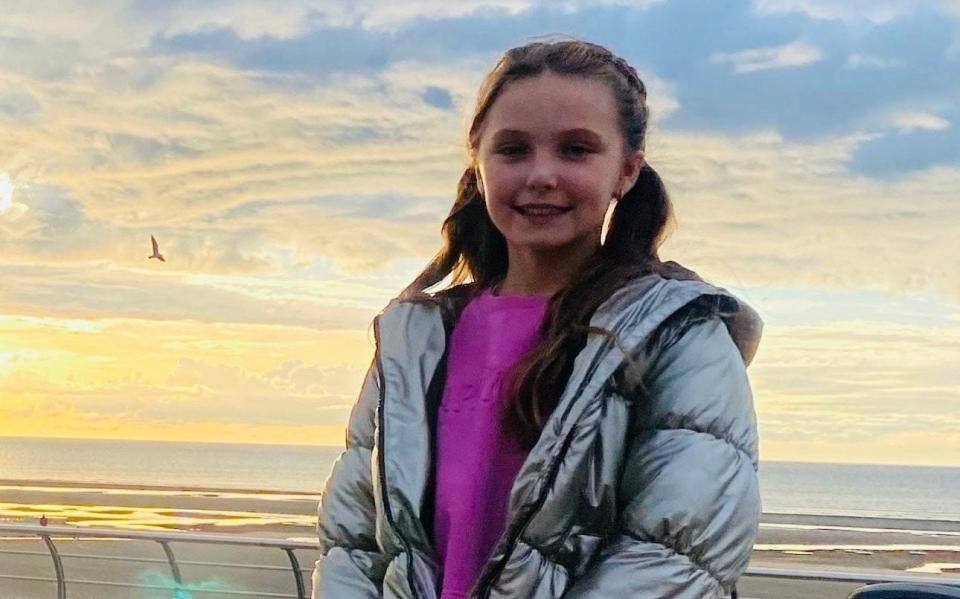An eight-year-old girl died of sepsis after being sent home by a family doctor who said the local hospital was full.
Mia Glynn visited a GP twice in four hours, but her parents Soron, 39, and Katie, 37, were told by the doctor to take her home despite her having symptoms of group A strep.
Her parents, from Biddulph, Staffordshire, first took Mia to the doctor after she started vomiting, had a severe headache and complained of a sore throat on December 5, 2022.
On the morning of December 8, her parents took Mia, who had developed a fever and a severe headache, back to the doctor.
A nurse practitioner told her mother that Mia's symptoms were caused by a virus and advised her to give her daughter fluids and paracetamol.
But Mia returned to the practice just after noon and was sent home by the GP after being examined.
Despite questions about whether she had the group A strep infection, which was common at the time, a doctor advised Mia's mother to give her fluids and ibuprofen and to wait until Mia went to bed to take antibiotics.
They were told to take their daughter home because the hospital was full and they had to wait in the hallway.
Mia slept in her parents' bed that night, but woke up in the early morning of December 9th, disoriented, with blue lips and a rash on her arms and legs.
She complained that she was hot, but felt cold.
Mia was taken to hospital by ambulance, where she was given intravenous fluids and antibiotics, but she went into suspected septic shock and went into cardiac arrest approximately 15 minutes after arriving at the hospital.
Despite attempts at resuscitation, she died approximately 20 minutes later.
Mia's cause of death was given as sepsis caused by a group A streptococcal infection.


After Mia's death, her parents, who also had a 12-year-old son Beau, commissioned lawyers specialising in medical negligence to investigate her care and get answers.
Speaking publicly for the first time since Mia's death, her mother Katie said: “Our world and hearts were forever shattered when our beautiful daughter was taken from us.
“Mia was taken to the doctor twice and was told her symptoms were viral. About 15 hours later she died of sepsis.
“The incredible and unbearable pain we feel is inexplicable and unimaginable.
“Our beautiful healthy girl was the happiest, smartest, most loving and caring girl who laughed, danced and brought joy and love to everyone she met.
“She provided so much laughter and fun.”
Following Mia's death, her family and supporters raised over £40,000 in Mia's memory through fundraising events including sponsored runs and donations from local businesses.
The family have donated more than £16,000 to the UK Sepsis Trust and have set up the charity aiM – an anagram of Mia's name – in memory of their daughter.
Mia's mother added: “We will never get over the pain of losing Mia, especially not the way it happened.
“Our family will never be the same without Mia. She had her whole life ahead of her and was taken from us in the cruelest way imaginable.


Her father, a technology teacher, said: “It was horrible to see Mia in her final moments.
“We feel so blessed that she was our daughter, but we are devastated that Mia was taken from us so early.
“Many people may have heard of sepsis, but it was only after what happened to Mia that we realized how dangerous it is.”
He added: “We need to educate the public and healthcare professionals to recognise the signs of sepsis and ask the question: “could it be sepsis?”
Victoria Zinzan, the specialist medical negligence lawyer representing the couple, said: “Sadly, in our work we see too many families affected by sepsis. Mia's death highlights the dangers of this condition.
“Early diagnosis and treatment are key to beating sepsis, so it is vital that people know what signs to look out for when it comes to detecting this incredibly dangerous and life-threatening condition.”
Broaden your horizons with award-winning British journalism. Try The Telegraph free for 3 months with unlimited access to our award-winning website, exclusive app, money-saving offers and more.

